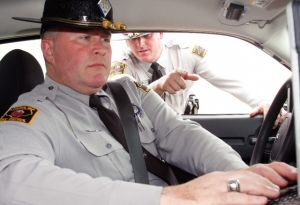Patrol concerns: short on manpower
By John Joyce
Published in News on February 4, 2013 1:46 PM

News-Argus/BOBBY WILLIAMS
Highway Patrol Trooper Chris Cook checks the computer in his patrol car as Trooper Bennie Grady looks on. The troopers were preparing to go back on their next shift. State Highway Patrol officials say the local patrol unit, along with every troop in the state, is understaffed.
Deep state budget cuts in back-to-back years and an unsustainable attrition rate are thinning the ranks of the North Carolina Highway Patrol and the problem is particularly acute in the troop that includes Wayne County.
First Sgt. Jeff Gordon, the public information officer for the state patrol, said that of the eight troops covering the state, each is understaffed, but that Troop C, which includes Wayne and 13 other counties, is particularly undermanned.
Of the 1,827 positions in the state, nearly 200 are currently vacant, he said.
Troop C has 39 vacancies, the most of any. Four of them are in Wayne, he said.
"The state's financial crisis cut $20 million from the (patrol) budget each of the last two years," said First Sgt. Jerry Burton, commander of the Wayne County unit. "That means fewer troopers, longer response times, offices not being open."
Burton also said that the shortage of money has meant that the patrol has not been able to buy all the new equipment it needs.
The patrol is doing its best to recruit troopers but the rigorous training standards mean only a select few candidates are able to finally don the uniform and take to the road.
In fact, the shortfall meant the State Patrol Academy in Raleigh had to shut down its basic training operations for a time in 2011.
Lt. J. C. Morton, a recruiter for the academy, said that the school is back up and running, but is still well behind in the race to staff the patrol's ranks.
He said that over the past six years, the agency has been losing nearly seven troopers a month to retirement and other causes. And, because classes from the early 1980s just came into the retirement-eligible age range, Morton said, that number in the last two years has climbed closer to eight per month.
A training class takes seven months and, at most, the academy trains 59 recruits per class. Of those recruits, roughly 25 percent wash out.
The classes are so long because the first 20 weeks are spent teaching and qualifying recruits in the state standards in basic law enforcement training. This is training that every law enforcement officer in the state of N.C. must go through, Morton said. The next nine weeks revolve around training specific to the Highway Patrol.
"We are the first line of defense for the state in natural or man-made disasters, such as oil spills or radiation leaks, as well as highway safety and emergencies. Our guys even get trained on how to deliver a baby on the side of the highway, and believe me, it has happened," Morton said.
Still, with 56 troopers lost in the time it takes to train 42 new ones, the state ends up 14 troopers down, widening the gap between need and available manpower.
"Funding is the big issue. We had to put a freeze on our basic academies because at the time we didn't know if we were going to have the monies to basically run the academy," Gordon said.
In addition to the academy, Gordon also said that a period of field training is required before a new trooper is actually out on patrol on his own.
"It takes about a full year to get what I call 'boots on the ground,'" Gordon said.
Both Morton and Gordon said that they are hoping to see an increase in applicants. But recruitment remains difficult because, no matter how great the need, the standards are high and the training regimen strict. Applicants must be U.S. citizens and at least 21 years old. They have to be high school graduates and have no felony or "serious" misdemeanor convictions. There also are stringent physical fitness and vision requirements, as well as psychological and polygraph screenings, a review board and an extensive background check.
Only the top 15 percent of candidates make the grade.
There is an abbreviated Fast Track School -- 16 weeks -- for applicants with previous law enforcement experience or who are already certified in criminal justice education. But those classes are smaller and are harder to fill.
The next class graduates in March, with another to graduate soon afterward. But unless funding improves, the patrol will remain below full staff, the officers said.
